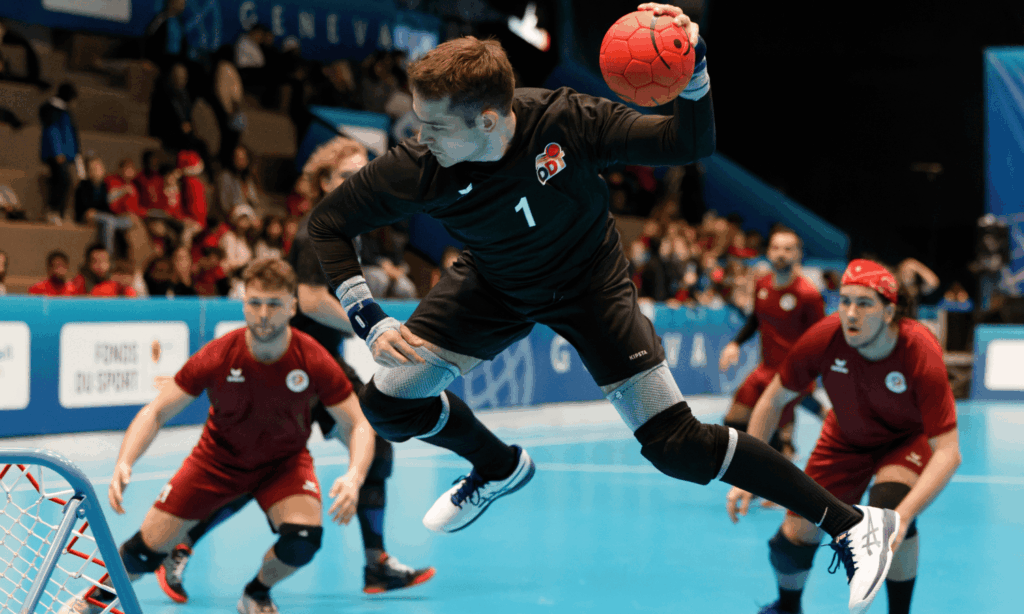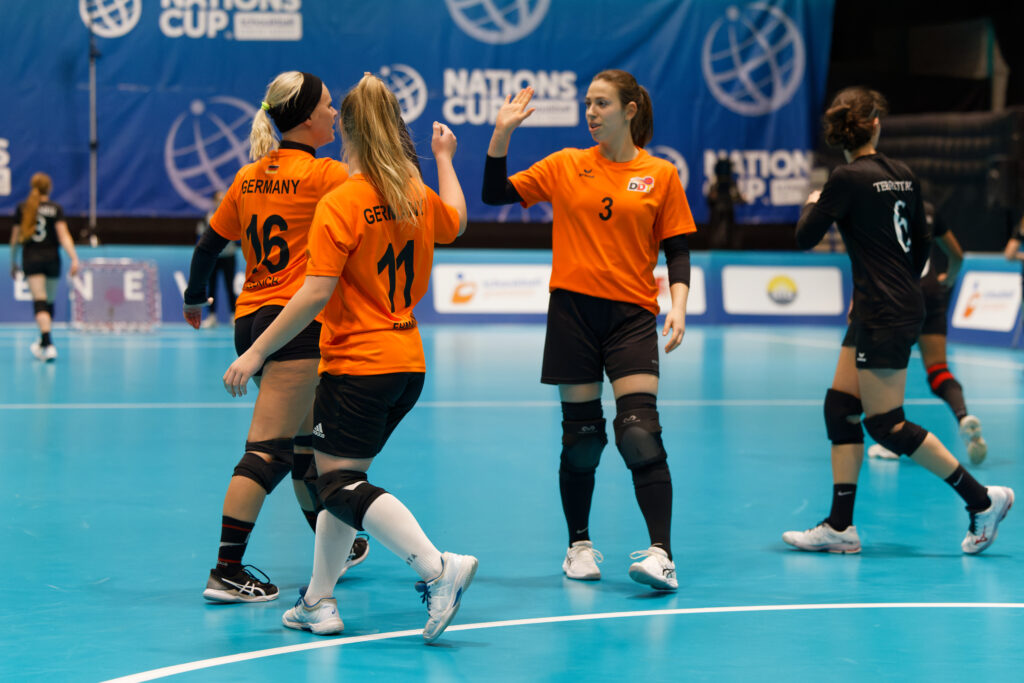
Was ist Tchoukball? – Fairer Teamsport mit Dynamik
Schnell. Kooperativ. Fair.
Tchoukball is a dynamic, tactical, and, above all, fair team sport played worldwide — from school programs to international tournaments. What makes it unique: actions that obstruct other players are prohibited. This creates an intense yet respectful game with lots of movement and team spirit — ideal for both beginners and competitive players alike.
How Tchoukball Works – The Game Concept
The objective of the game is to throw the ball onto the frame (an inclined rebound net) so that the opposing team cannot catch the rebound. Both frames can be used, allowing for rapid changes in the direction of play.
After a point, a fault, or a successful catch, possession of the ball automatically changes. Play continues smoothly and without interruption.
Punkte werden erzielt, wenn:
- der Ball nach dem Rückprall nicht gefangen wird
- der Ball das Frame verfehlt, ins Aus geht oder in der verbotenen Zone landet
- der Ball nach einem Frame-Wurf den eigenen Werfer trifft
Verstöße und verbotene Aktionen:
- Dribbling mit dem Ball
- mehr als 3 Bodenkontakte bei Ballbesitz
- mehr als 3 Pässe (außer beim Anwurf)
- Ball fallen lassen
- gegnerische Aktionen behindern oder den Ball abfangen
- Betreten der verbotenen Zone vor Abwurf
- eigene Frame-Würfe fangen
- Treffen des Rahmenrandes des Frames
- mehr als 3 Würfe in Folge auf dasselbe Frame

Spielidee. Geschichte. Fairplay.
Tchoukball – Geschichte & Werte
Entwickelt wurde Tchoukball in den 1960er-Jahren vom Schweizer Sportarzt Dr. Hermann Brandt, der einen Sport schaffen wollte, der Gesundheit, Fairness und Spaß vereint. Ziel war es, Verletzungsrisiken zu minimieren – ohne auf Tempo und Spannung zu verzichten. Entstanden ist ein Spiel, das auf Respekt basiert und in dem Angriffs- und Verteidigungsphasen blitzschnell wechseln.
Einfach zugänglich – Für alle
Die Grundtechniken im Tchoukball sind leicht zu erlernen. Bereits beim ersten Training erleben Neulinge Spielspaß ohne Frust. Körperkontakt ist verboten – das ermöglicht inklusive Teams, in denen Frauen, Männer, Kinder und Menschen mit Einschränkungen miteinander oder gegeneinander spielen können. Der Sport eignet sich somit für Schulen, Vereine und ebenso für den Leistungssport.
Fairness an erster Stelle
Tchoukball lebt von einer einzigartigen Fairplay-Kultur. Respekt vor Mitspielenden und Gegner*innen steht im Mittelpunkt. Es wird nicht protestiert, sondern auf Fehler selbst hingewiesen. Ein durchdachtes Regelwerk ermöglicht allen Alters- und Leistungsgruppen ein spannendes, gerechtes Spiel – unabhängig von körperlicher Überlegenheit.
Intensiv & körperlich fordernd
Tchoukball beansprucht den ganzen Körper: Laufen, Springen, Werfen, Reagieren – die schnellen Wechsel zwischen Angriff und Verteidigung fordern Konzentration, Ausdauer und Koordination. Trotz der Fairness ist Tchoukball körperlich intensiv und bietet Raum für sportliche Höchstleistungen.
Taktik entscheidet
Mehr als Kraft und Schnelligkeit zählt das Zusammenspiel im Team. Tchoukball fördert vorausschauendes Denken, Spielintelligenz und strategische Abstimmung. Nur wer miteinander agiert, kann erfolgreich sein. So entsteht ein echter Mannschaftssport, bei dem sich alle einbringen.

The Tchoukball Charter
Die Tchoukball-Charta bildet das Fundament unseres Sports. Sie beschreibt nicht nur Regeln für das Spiel, sondern auch Werte und Haltungen, die weit darüber hinausgehen. Im Mittelpunkt stehen Fairplay, Respekt und das gemeinsame Streben nach sportlicher Exzellenz. Sie macht deutlich: Tchoukball ist mehr als ein Wettbewerb – es ist eine Haltung, die das Miteinander auf und neben dem Spielfeld prägt.
The Tchoukball Charter
Tchoukball excludes any striving for prestige,whether individually or as a team; rather it is a sport in which players pursue excellence through personal training and collective effort.
Tchoukball is open to playersof all degrees of ability (natural or acquired) and skill. Inevitably one will encounter players of every possible ability/skill level during play. Every player must adapt their own play and attitude (technical or tactical) to the circumstances of the moment because each player, teammate or opposing player is due proper respect and consideration.
On an individual level: the attitude of a player is paramount for it implies respect for themself, for their own teammates and for the opposing team’s players regardless of whether any are stronger or weaker players than oneself.
On a team level: no outcome, whatever it might be, should ever impact one’s sense of importance, individually or as a team, and it should never lead to sectarian rivalry. From victory one can derive satisfaction and even joy, but never exaggerated pride. The joy of winning should provide encouragement. Arrogance in victory carries with it the struggle for prestige, which is a source of common conflict among humans and condemned within the sport of tchoukball.
Tchoukball requires total dedication: one must keep constant watch on the movement of the ball and the other players – both objectively and with empathy. As one participates individually in the sport, one subjects oneself to the group’s needs. The result is that in the course of a game, different personalities come together as one when they react collectively within the game.
Thus, in Tchoukball:
- there is a collective achievement within a team. This binds the players together, it teaches appreciation and esteem for the values of others, and it creates a feeling of oneness in the common effort of a small group.
- there is an acceptance of the attitudes of the opposing team with whom one must engage in opportunistic play while resisting any hostile undercurrents.
- each player’s major concern is to strive for beauty of play. The universal experience of sport can be summed up by the expression: “elegant play begets elegant play.” „Elegantes Spiel bringt elegantes Spiel hervor.“
This attitude is the basis for social interaction of tchoukball: it encourages one to aim for perfection while always avoiding any negative conduct toward the adversary.
The aim of tchoukball is therefore the avoidance of conflict, with one main goal in mind: fair play that does not compromise the level of play but rather links the two teams together in common activity. The beauty of one team’s play makes possible and reinforces the beauty of play by the other team.
Tchoukball provides social exercise through physical activity. By pooling the resources of all, everyone participates, with the more adept players accepting responsibility for teaching the less adept; therefore, there is no real individual champion, but rather a collective striving for perfection.
When one says, “let the best person win,” it should mean that a person achieves their best through adequate preparation. This being so, it is appropriate that the results reward the efforts which players have undertaken, individually and as a team.
Within these limits, a victory can and should bring satisfaction and meet with an adversary’s respect. Victory should inspire in an adversary a desire to do as well, without any feeling of belittlement. Winners should not convey any feeling of arrogant domination. Rather, a sense of healthy satisfaction on the winner’s side is like a handshake to encourage the adversary to continue to train properly.
For these reasons, the notion of “victor” should give way to the simpler more appropriate one of “winner.” Play as a means of perfecting one’s performance is a basic desire that every activity should include and develop. It is toward this goal that every Tchoukball team must work, whether it is in the smallest, friendliest match or the most important meeting “at the summit.”
Remember, no set of rules can replace a player’s respect for one another and the Spirit of the Game.